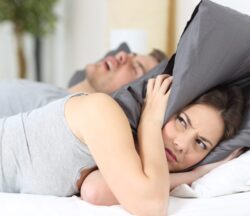
Many people — and their partners — have poor sleep due to snoring. Snoring is more than just an annoyance, it’s often a symptom of obstructive sleep apnea (OSA). Studies estimate that a half a million adults suffer from snoring and obstructive sleep apnea which makes them two of the most common sleep disorders. In addition to preventing you from getting a good night’s sleep, snoring and/or sleep apnea can also increase your risk of cardiovascular and systemic diseases.
The most common treatment for OSA is a CPAP machine, but Dr. Brent Engelberg of AH Smiles, a dental provider in Arlington Heights, IL, can help with an alternative treatment in the form of an oral appliance to wear while you’re sleeping.
Q: What causes sleep apnea?
Obstructive sleep apnea, or OSA, is most commonly associated with obesity or excess weight and is also frequently seen in men, those with diabetes and those that smoke. As the muscles relax during sleep, tissues in the throat can collapse, restricting airflow to the rest of the body. The affected sleeper will usually awaken multiple times during the night, gasping for air. He or she will usually wake up still feeling tired, may frequently fall asleep during the day, and may have problems with memory and concentration.
Q: I thought the only option for sleep apnea was CPAP therapy. How does the oral appliance work?
Although CPAP therapy is still the most commonly prescribed treatment for OSA and snoring, an oral appliance offers a similar result. Both provide different ways of keeping the airway open during sleep, when the soft tissue in the throat are more relaxed.
Instead of a constant pressure from flowing air holding the airway open during sleep, as is the case with CPAP therapy, the oral appliance is custom-fitted to the patient’s mouth to position the mouth in such a way that the airway remains open. Wearing the appliance moves the bottom jaw forward to keep the soft tissue from collapsing over the airway. It’s durable enough to withstand bruxism — teeth grinding — so even those with a habit of grinding teeth at night can benefit from the device.
Q: How comfortable is a sleep apnea oral appliance?
Dr. Engelberg meets with patients for an individual consultation where he will examine their mouths and make sure the appliance is fitted correctly and comfortably. Although the device repositions the jaw, it’s designed to fit comfortably inside the mouth with as little disruption to sleep as possible. Most patients report better sleep while using the oral appliance, leading to happier mornings!
Q: Do I have to see a dentist to get it?
What makes this appliance so comfortable and effective is how well it’s fitted to the individual patient’s mouth. Dr. Engelberg will meet with you to discuss your needs, gather precise measurements and your mouth’s specific details, and will work with you to make sure the device is as comfortable as possible. We don’t want discomfort to prevent you from getting the best night’s sleep possible!
Our caring staff at AH Smiles in Arlington Heights, IL wants to help you get better sleep. Call (847) 230-9703 or schedule an appointment online today.
